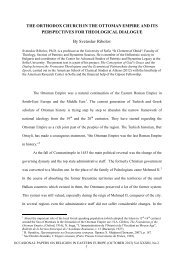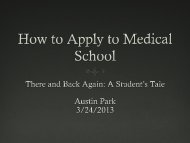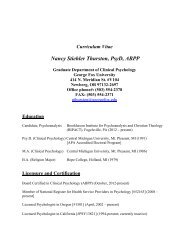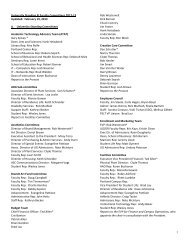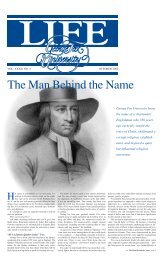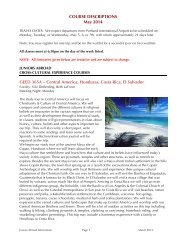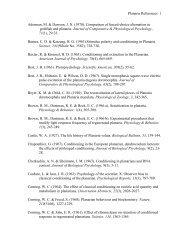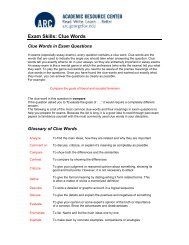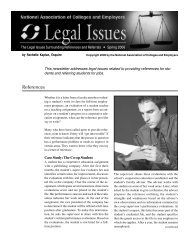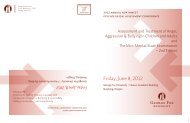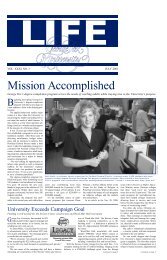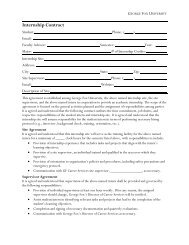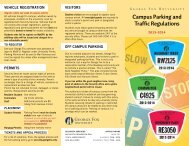LIFE Vol 33, No 1 - George Fox University
LIFE Vol 33, No 1 - George Fox University
LIFE Vol 33, No 1 - George Fox University
You also want an ePaper? Increase the reach of your titles
YUMPU automatically turns print PDFs into web optimized ePapers that Google loves.
<strong>Vol</strong> <strong>33</strong> <strong>No</strong> 1 12/20/02 3:31 PM Page 6<br />
6<br />
The Vagabond<br />
Rolf Potts (’93) has a well-worn passport, a new book, a growing reputation as a literary<br />
travel writer, and no permanent address<br />
Rolf Potts is 32. He doesn’t have a respectable<br />
9-to-5 office job. He doesn’t have a wife or a<br />
car. He certainly doesn’t have a mortgage. Rolf<br />
Potts has a Web site (rolfpotts.com), a pen, and the road.<br />
Middle-class American respectability isn’t on the<br />
horizon for Potts — who’s been traveling nonstop<br />
through more than 30 countries since 1998. He’s<br />
become an award-winning travel writer and an advocate<br />
for “the ethic of vagabonding.” He’s written an advice<br />
and philosophy guidebook about extended budget travel.<br />
It urges readers to pursue not material wealth, but a<br />
simpler life rich in personal and spiritual experiences<br />
found in travel and outside the sterile world of package<br />
vacations. Vagabonding: An Uncommon Guide to the<br />
Art of Long-Term World Travel is being published this<br />
month by a division of Random House.<br />
Those who knew Potts at <strong>George</strong> <strong>Fox</strong> might have<br />
expected something countercultural like this from the<br />
longhaired runner who wrote a satirical column in the<br />
student newspaper. Potts’ column, Standing in the Shower,<br />
Thinking, ran next to a photo of himself standing<br />
bare-chested and unsmiling in a shower stall. His column<br />
comparing <strong>George</strong> <strong>Fox</strong>’s homecoming to prostitution<br />
by the school led to a heated memo exchange with<br />
then-President Ed Stevens. Potts describes the dialogue<br />
as ultimately constructive. “While I said a lot of things<br />
[in the column] that people didn’t like, I’ll still assert<br />
that I was always humorous, never slanderous, and I<br />
most always had a serious point to make,” he says.<br />
Former classmates tell him now he scared them.<br />
Potts’ longhaired, grunge-dressed friends, his organization<br />
of underground off-campus dances, and a series of<br />
campus pranks established him as a self-described black<br />
sheep. It was a misperception he encouraged. “I invested<br />
most of my time into studying and running, and my<br />
reputation as a ne’er-do-well was largely a rumor.”<br />
A native of Kansas, Potts was a straight-A student<br />
and the son of teachers. His father, <strong>George</strong>, taught biology<br />
in high school and at Friends <strong>University</strong> and wrote<br />
wildlife guidebooks. Potts’ mother was a grade-school<br />
teacher who, he says, “once led a fearless campaign to<br />
make the salamander the Kansas state amphibian."<br />
The Renegade Runner<br />
Potts transferred to <strong>George</strong> <strong>Fox</strong> as a sophomore, pursuing<br />
a screenwriting career by majoring in both writing/literature<br />
and communication/video production. His<br />
older sister, Kristin (’91), was already at <strong>George</strong> <strong>Fox</strong>.<br />
Both were key runners for <strong>George</strong> <strong>Fox</strong>’s nationally<br />
ranked cross country and track teams. He raced his way<br />
into the Bruin record book,<br />
becoming one of the school’s<br />
all-time top-10 fastest cross<br />
country runners and an NAIA<br />
All-American Scholar-Athlete.<br />
Potts says his <strong>George</strong> <strong>Fox</strong><br />
friends and the camaraderie<br />
and excellence in the track and<br />
cross-country teams helped<br />
shape him. Intellectually, his<br />
religion and philosophy classes<br />
provided his most affecting<br />
classroom experience. “I<br />
arrived at <strong>George</strong> <strong>Fox</strong> kind of<br />
burned out on what I perceived<br />
to be evangelical phoniness,<br />
and my religion classes helped<br />
me discover a whole new<br />
depth and integrity to the<br />
Christian faith,” he says.<br />
After graduation, he briefly<br />
worked as a landscaper to fund<br />
an eight-month, 38-state road<br />
trip with friends. “At the time,<br />
I thought that this would get<br />
travel out of my system before<br />
I went on to a more respectable<br />
life.” It didn’t. After a couple years doing odd<br />
jobs in Kansas and a failed attempt to write a book<br />
about his U.S. travels, he joined a small migration of<br />
<strong>George</strong> <strong>Fox</strong> young alumni who went to Korea in the<br />
1990s to teach English.<br />
CATHRINE WESSEL<br />
You Must Be Filthy Rich …<br />
Interestingly, some of the harshest responses I’ve<br />
received in reaction to my vagabonding life have<br />
come while traveling. Once, at Armageddon (the site<br />
in Israel, not the battle at the end of the world), I met<br />
an American aeronautical engineer who was so tickled<br />
because he had negotiated five days of free time<br />
into a Tel Aviv consulting trip that he spoke of little<br />
else as we walked through the ruined city. When I<br />
eventually mentioned that I’d been traveling around<br />
Asia for the past 18 months, he looked at me as if I’d<br />
slapped him. “You must be filthy rich,” he said acidly.<br />
“Or maybe,” he added, giving me the once-over, “your<br />
mommy and daddy are.”<br />
I tried to explain how two years of teaching English<br />
in Korea had funded my freedom, but the engineer<br />
would have none of it. Somehow, he couldn’t accept<br />
that two years of any kind of honest work could have<br />
funded 18 months (and counting) of travel. He didn’t<br />
even bother sticking around for the real kicker: In<br />
those 18 months of travel my day-to-day costs were<br />
significantly cheaper than they would have been back<br />
in the United States.<br />
— from Vagabonding by Rolf Potts, © 2003 by Rolf<br />
Potts. Printed by arrangement with Villard Books, a<br />
division of Random House Inc.<br />
“Those early months in Korea were a low point for<br />
me, since I sort of considered myself a failed writer,” he<br />
says. “But it turned out that Korea was just what I needed.<br />
Teaching in Korea was hard work, but I learned how<br />
to operate and interact in a foreign culture — which<br />
became invaluable to me later as a traveler. I also did lots<br />
of reading and dreaming about travel. My plan was teach<br />
for a couple years, travel as long as I could on my savings,<br />
and then figure something else out.”<br />
In the spring of 1998, Potts e-mailed several essays<br />
from his failed U.S. travel book to online magazines.<br />
The most prominent of the e-zines, Salon.com, published<br />
his Las Vegas chapter. Flush with success, he<br />
began writing essays about Korea; Salon published five.<br />
When school ended, Potts<br />
set out across Asia. He decided<br />
— motivated by “a kind of<br />
traveler’s angst” — to infiltrate<br />
the restricted island<br />
where Leonardo DiCaprio’s<br />
movie The Beach was being<br />
filmed. Potts’ midnight boat<br />
assault failed, but his essay<br />
Storming The Beach landed<br />
on the front page of Salon and<br />
in Houghton Mifflin’s annual<br />
Best American Travel Writing.<br />
Salon promoted him to be<br />
its “Vagabonding” columnist.<br />
Having written less than a<br />
dozen travel stories in his life,<br />
he now was appearing alongside<br />
Garrison Keillor and<br />
other established writers.<br />
“<strong>No</strong>body knew I was just<br />
some schmuck with a backpack<br />
wandering around Asia.”<br />
Traveling through Asia,<br />
Europe, and Africa can be<br />
dangerous. He’s been stranded<br />
in Siberia. A pair of Moroccans<br />
in Turkey stole his money<br />
and passport after giving him a crème-sandwich cookie<br />
laced with a date-rape drug. A leaky water bottle turned<br />
his quest for serious solitude in the Sahara into a forced<br />
march for safety. Each adventure appeared in Salon.<br />
Adventure to Potts isn’t seeking danger; it’s being<br />
BOOK COVER COURTESY VILLARD BOOKS<br />
Rolf Potts was a<br />
straight-A studentathlete<br />
with a renegade<br />
reputation. Since graduating,<br />
he has run out<br />
of water in the Sahara,<br />
caught cholera in Laos,<br />
been drugged and<br />
robbed in Istanbul, and<br />
lived to write about it<br />
all. His essays have<br />
appeared in National<br />
Geographic Adventure,<br />
Condé Nast Traveler,<br />
Islands, and on National<br />
Public Radio’s Savvy<br />
Traveler program.<br />
Potts’ first book,<br />
Vagabonding, comes<br />
out January 2003.<br />
open to the unexpected. Rather than mountaineering or<br />
kayaking, “you can have a truer adventure simply by<br />
taking a bus to an unfamiliar village on the map, going<br />
for a stroll through some untouristed corner of a big city,<br />
or patiently using your phrasebook to understand the<br />
wacky old man who chats you up in the local market.”<br />
By 2000, five of his Salon essays had been published<br />
in award anthologies. His increased visibility led to better-paying<br />
work for several glossy travel magazines.<br />
The Monastery-Disco Mix<br />
Travel writing is not an escape from work; it requires<br />
both travel and the solitary discipline of writing. “Mixing<br />
these two elements, again and again, is like working<br />
in a disco while living in a monastery,” he says. “Unless<br />
you can sequester yourself into a room or a library for<br />
days and weeks and focus on your craft, you aren’t<br />
going to write in a way that stands out from the other<br />
millions of people who want to be travel writers.” Travel<br />
writers also face unrealistic expectations. “People get<br />
confused and disappointed when they find out that you<br />
don’t make very much money, you can’t swing from tree<br />
to tree on vines, and you sometimes get lost in your own<br />
hometown,” he says.<br />
Potts says he’s a confirmed bachelor. “I’ve probably<br />
had enough doomed relationships with European and<br />
East Asian lasses in the last six years to write a ‘Cross-<br />
Cultural Romance for Dummies’ book.”<br />
He’s recently been writing in Thailand, where ––<br />
along with Oregon, Kansas, Egypt, and Korea –– he<br />
says he feels vaguely at home. Still, he’s having too<br />
much fun to stop traveling.<br />
“I get the privilege of learning or seeing something<br />
new every day,” he says. “Sometimes I feel like a mad<br />
scientist who forgets to eat or change his clothes because<br />
he’s always obsessing on some new equation. I’m so<br />
wrapped up in the ongoing experience of travel, writing,<br />
and research that I don’t dwell much on settling down or<br />
earning a more reliable income. I’m sure I will in time,<br />
but I’m certainly not going to force the issue now.”<br />
Potts thinks he might have a future in teaching. He<br />
taught a travel-writing seminar in Paris last summer. For<br />
now, he has plenty of writing projects to keep him busy.<br />
A second book about his travel through the Orient is<br />
scheduled for print in 2004.<br />
Oddly, Rolf Potts is sounding rather respectable.<br />
— Rob Felton



